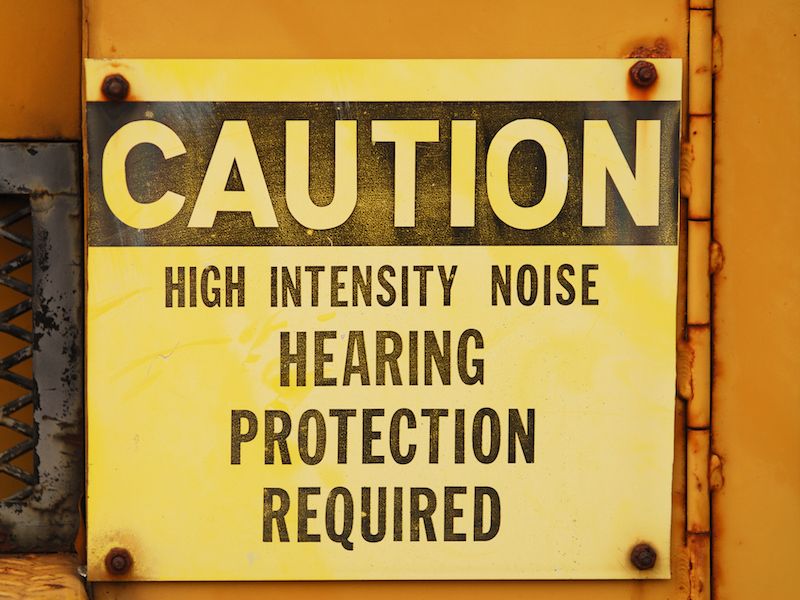
Understanding you need to safeguard your hearing is one thing. It’s a different story to know when to protect your ears. It’s harder than, for example, knowing when you need sunscreen. (Are you going to go outdoors? Is the sun out? You should be using sunscreen.) It isn’t even as simple as knowing when to wear eye protection (Handling hazardous chemicals? Doing some building? You need eye protection).
It can feel as though there’s a large grey area when dealing with when to wear hearing protection, and that can be dangerous. Usually, we’ll defer to our natural inclination to avoid hearing protection unless we have information that a particular activity or place is hazardous.
A Tale of Risk Assessment
In general, we’re not very good at assessing risk, especially when it comes to something as intangible as injury to the ears or the probability of lasting sensorineural hearing loss. To prove the point, here are some examples:
- A very loud rock concert is attended by person A. The concert lasts roughly 3 hours.
- A landscaping company is run by person B. After mowing lawns all day, she goes home to quietly read a book.
- Person C is an office worker.
You may presume that person A (let’s call her Ann, to be a little less clinical) may be in more hearing danger. Ann leaves the show with her ears ringing, and she’ll spend the majority of the next day, struggling to hear herself talk. It seems fair to presume that Ann’s recreation was very hazardous.
The noise that person B (let’s just call her Betty), is subjected to is not as loud. There’s no ringing in her ears. So her ears must be safer, right? Well, not exactly. Because Betty is mowing all day. So although her ears don’t ring out with pain, the harm builds up little by little. If experienced on a regular basis, even moderately loud sounds can have a damaging affect on your hearing.
Person C (let’s call her Chris) is even less obvious. Lawnmowers come with instructions that indicate the hazards of persistent exposure to noise. But even though Chris has a relatively quiet job, her long morning commute through the city each day is rather loud. Also, while she works at her desk all day, she listens to her music through earbuds. Is protection something she should think about?
When is it Time to Start to Consider About Safeguarding Your Ears?
The standard guideline is that if you have to raise your voice in order to be heard, your environment is noisy enough to do harm to your hearing. And you really should consider using earmuffs or earplugs if your surroundings are that loud.
The cutoff needs to be 85dB if you want to get scientific. Noises above 85dB have the potential, over time, to result in injury, so you need to consider wearing hearing protection in those circumstances.
Your ears don’t have their own decibel meter to alert you when you reach that 85dB level, so countless hearing specialists suggest obtaining special apps for your phone. You will be able to take the necessary steps to safeguard your ears because these apps will tell you when the noise is approaching a dangerous volume.
A Few Examples
Your phone might not be with you wherever you go even if you do download the app. So we might develop a good standard with a few examples of when to protect our ears. Here we go:
- Exercise: You know your morning cycling class? Or maybe your evening yoga session? All of these cases could require hearing protection. The high volume from instructors who use loud music and microphones for motivation, though it might be good for your heart rate, can be bad for your hearing.
- Listening to music with earbuds. This one calls for caution, more than protection. Give consideration to how loud the music is, how long you’re listening to it, and whether it’s going directly into your ears. Consider using headphones that cancel out outside sound so you don’t need to crank up the sound to hazardous levels.
- Working With Power Tools: You know you will need hearing protection if you work every day in a factory. But what if you’re simply working in your garage all day? Even if it’s just a hobby, hearing specialists suggest wearing hearing protection if you’re using power equipment.
- Driving & Commuting: Spending all day as an Uber or Lyft driver? Or maybe you’re just waiting downtown for work or getting on the subway. The constant noise of living in the city, when experienced for 6-8 hours a day, can cause damage to your hearing over the long haul, particularly if you’re cranking up your music to hear it over the commotion.
- Every day Chores: Even mowing a lawn, as previously explained, necessitates hearing protection. Chores, including mowing, are most likely something you don’t even think about, but they can cause hearing damage.
These examples might give you a good baseline. If there is any doubt, however, use protection. In most cases, it’s better to over-protect your hearing than to leave them exposed to possible damage down the road. Protect today, hear tomorrow.